By Gina Smith and Ted Rall
aNewDomain — The police tape The Los Angeles Times said it used to justify Ted Rall’s firing as a longtime editorial cartoonist and columnist sounds spliced, according to six different audio technicians we interviewed.
— The police tape The Los Angeles Times said it used to justify Ted Rall’s firing as a longtime editorial cartoonist and columnist sounds spliced, according to six different audio technicians we interviewed.
“There are distinct clicks (showing) where the tape was almost certainly spliced,” said the Chicago-based audio expert this site hired to enhance the 14-year-old tape of Rall’s jaywalking arrest. It’s the same audio that police gave Times editors, in an attempt to prove Rall lied in print about his 2001 jaywalking run-in with the Los Angeles Police Department.
A Los Angeles-based musician with expertise in sound recordings told aNewDomain the same thing in a separate interview: He said he felt sure that the WAV police recording Times reporter Paul Pringle emailed Rall — he was trying to show why the Times believed his story was wrong about being handcuffed and otherwise poorly treated — was spliced. Rall claims of being handcuffed and that there were vocal witnesses yelling at the officer was the basis of his firing.
On that first tape you couldn’t hear evidence of either — or much of anything, really. But enhanced audio has since emerged that backed up Rall’s story and vindicated him — at least in the court of public opinion.
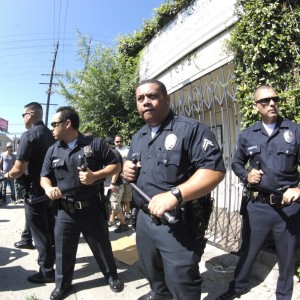 “Those clicks tell me that someone took something out,” the recording expert said.
“Those clicks tell me that someone took something out,” the recording expert said.
Someone. But who?
Neither engineer felt comfortable sharing his name in print for fear of police retribution. Only the production house, Post Haste Digital, so far is letting us use its name. Post Haste so far has revealed numerous additional details about audio that was hiding behind static and whistling on the first police tape, information that convinced many people, including Rall’s most strident political critics, that his firing was unfair.
All six audio technicians, ranging from professional to amateur and living in various locales around the United States, independently drew the same conclusion: The police audiotape had been deliberately altered. We now await legally-valid, conclusive and on-the-record evidence from audio forensic experts as to whether the tape was spliced or otherwise tampered with.
If we are going to believe the six independent audio experts’ claims that someone edited the police tape, it clues us in on a number of mysteries, like:
- Why is the LAPD tape so short? At six minutes 20 seconds, the audio capturing the jaywalking incident portrays a lightning-fast arrest, detention, ticketing, ticket signing and a voice back at police HQ to checking for outstanding warrants. That’s too short. (The typical processing time, beginning to end, of misdemeanors and infractions is about 10 to 15 minutes.) Splicing would explain a shorter tape time throughout.
- Why didn’t the ticketing officer record his name and other details as LAPD policy requires? Policy requires officers to run, record and save recordings of interactions with the public in discrete, contiguous sections. It also requires the officer on tape saying his name, incident location, the name of the suspect, the offense, and the time and day. But that information isn’t on the LAPD tape police gave the Times to dispute Rall’s story.
- Also not on the tape: the loud sound of a second motorcycle officer approaching and telling the officer who handcuffed Rall for the jaywalking offense to scoot. Why isn’t it? Editing or splicing also explains why the tape seems so truncated, especially if someone lopped off the approaching motorcycle cop at the end of the recording, along with the required ID information. That it’s missing appears to make the tape illegal and unusable by cops, at least according to the LAPD Manual.
- Where’s the other cop? Rall says he distinctly remembers the LAPD officer loudly telling him to stand still and not to move after the officer cuffed Rall for the jaywalking offense, which was the action that got passing pedestrians you hear on the tape so riled up. Yet the officer’s order is not anywhere on the original dub the Times sent Rall, nor is it on the enhanced version. Where is that audio?
In case you’re wondering, this wouldn’t be the first time Los Angeles police leaked an arrest audiotape to the media in violation of California law, and leaked one that contained just a small portion of what police originally recorded. - Where’s the signature of the LAPD transcriber? In addition to the tape, which the Times’ said was the police’s proof that Rall’s story about being handcuffed in front of shouting passersby was made up, Times reporter Pringle emailed Rall a document. The PDF contained a copy of Rall’s jaywalking ticket and the Internal Affairs complaint he’d filed after the incident in 2001. It also contained an official LAPD transcript, which covered about 20 seconds (out of six minutes and 20 seconds total) of Officer Will Durr and Rall talking. But the usual signed statement by the LAPD transcriber is missing. That’s the statement certifying that the transcript is legit and the tape hasn’t been messed with. So why is it MIA? We don’t know.
- Why the fluctuating sound quality between the two other police incidents on the tape Pringle gave Rall? Two incidents on this recording appear before and after Rall’s. But listen and you’ll notice right away the striking difference in sound quality between Rall’s jaywalking incident, in the middle, and the other two police stops. Sound for the other two is noticeably superior — and clearer and louder. But all three incidents were recorded the same day, by the same device, placed presumably in the same place in the officer’s uniform.
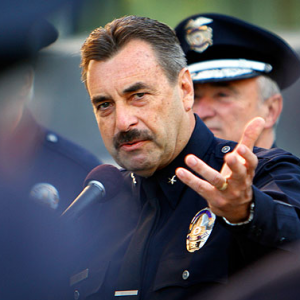 What we do know for a fact is that the WAV file was converted from a dub that was itself a dub of the original audiotape. So it was a third-generation copy at best. Analysis of the original tape would probably yield better results, said the LA audio expert we hired: “You can clean up a bad tape, but if the quality is bad, there’s only so much you can do … you can’t make a steak out of a hamburger.”
What we do know for a fact is that the WAV file was converted from a dub that was itself a dub of the original audiotape. So it was a third-generation copy at best. Analysis of the original tape would probably yield better results, said the LA audio expert we hired: “You can clean up a bad tape, but if the quality is bad, there’s only so much you can do … you can’t make a steak out of a hamburger.”
It’s also obvious, if you listen to both the pre-enhanced WAV file and the enhanced version by Post Haste, that Officer Durr’s whistling during the arrest totally covers up some pretty key audio.
On the original, for instance, his whistling thoroughly covered up a woman shouting “Take off his handcuffs!”
As you can hear when you compare the original to the second enhanced version (listen here), as soon as you remove all that whistling by the officer you begin to hear the opposite of the cops’ story, at least the one as related to Rall by the Times’ Pringle and Goldberg.
Was the cop’s persistent whistling accidental? You’ve got to wonder. But we don’t know.
There is, in the end, a lot to wonder about. Why did the editors choose to believe the cops’ inaudible tape over Rall, a longtime editorial contributor? Pringle, after all, is no lightweight. He is a George Polk Award-winning investigative journalist. And then there’s Nick Goldberg, a respected editorial page editor at the Times, the nation’s third-largest daily newspaper. Yet Pringle and Goldberg ignored Rall’s requests to take the time to think about the LAPD’s claims more carefully. They didn’t move to investigate the really poor quality audio, which seems odd, too.
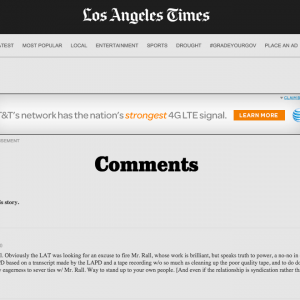
Worse, they have yet to acknowledge the new information on Goldberg’s Note to Readers, a public attack on Rall’s professional integrity if there ever was one, and one that could haunt his award-winning career from this point forward.
Editors refuse to answer reporters’ questions about the Rall controversy, and they’ve even turned off comments on the Note.
So far the LAPD has not commented either, except in the form of a celebratory police union (LAPPL) blog post on LAPD.com the day after the Times‘ announcement.
As a result of all this drama, Rall is out of a job he once valued. His reputation has been seriously damaged.
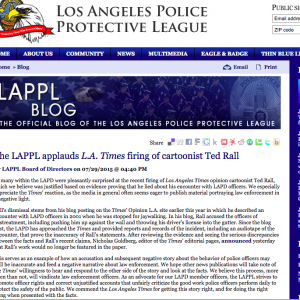 And all because of a tampered tape. Now Rall and his defenders and lawyers must find out who did it, and how.
And all because of a tampered tape. Now Rall and his defenders and lawyers must find out who did it, and how.
A Postscript: Now that we’re moving into the age of the uniform video camera, the LAPD is once again corrupting a technology designed to reduce the temptation for police brutality and other misconduct. Under a policy adopted in April, LAPD officers will be allowed to view the video from their body cams before writing up their reports. That way, they’ll be able to explain away their actions in light of what the video shows.
For aNewDomain and the new SkewedNews satire site, I’m Gina Smith. Ted Rall also contributed to this story.
Cover image: After Effects via YouTube; All images, All Rights Reserved.
For further reading, check out these links:
Ted Rall-LAPD-LA Times Scandal: Timeline by Gina Smith (aNewDomain)
A Note to Readers (about the Ted Rall firing) by Los Angeles Times editorial page editor Nick Goldberg (LA Times)
LAPPL Applauds LA Times Firing of Ted Rall (by Los Angeles Police Protective League Board of Directors (LAPD.com)
LAPD Convinced LA Times To Fire Me After I Criticized Cops [exclusive] by Ted Rall (aNewDomain commentary)
Ted Rall, Los Angeles Times Cartoonist, Dropped After Blog Post Appears To Stretch The Truth (FoxNews.com)
Ted Rall LAPD-LA Times Scandal: A Discrepancy In The Cop’s Story [exclusive] by Ted Rall (aNewDomain commentary)
Ted Rall-LAPD-LA Times Battle: New Tape Proves Cops, Times Were Wrong [exclusive] by Ted Rall (aNewDomain commentary)
Ted Rall LAPD LA Times Scandal: Second Enhanced LAPD Tape Reveals Startling Details [exclusive] by Ted Rall, Gina Smith and Tom Ewing (aNewDomain)
Ted Rall LAPD Scandal: Rall Vindicated, LAPD And LA Times under Fire by Tom Ewing and Gina Smith (aNewDomain news)
Did The LAPD Have A Political Cartoonist Fired? by Ryan Steadman and Guelda Voien (The New York Observer)
‘Cleaned-Up’ Audiotape of Political Cartoonist’s Clash With LAPD Bolsters His Story by Hunter Harris (New York Observer)
In Defense of Ted Rall, A Hard Guy To Defend by Ken Kurson (New York Observer opinion column)
Why Didn’t The Los Angeles Times Examine The Bad Audio from the LAPD? by Ted Rall (aNewDomain commentary)
Cops Gun Down Unarmed Journalist’s Career by Greg Palast (Reader Supported News, opinion)
Ted Rall: Fisking The Los Angeles Times by Ted Rall (aNewDomain commentary)
Why Won’t The L.A. Times Admit They Were Wrong About Cartoonist Ted Rall? by Susie Madrak (Crooks and Liars)
14 Years Ago, A Woman Vindicated Me Now by Ted Rall (Common Dreams)
Editor: LA Times “Cannot Comment” On Ted Rall. Why? By Gina Smith (aNewDomain commentary)
LAPD Gets On Its Biggest Critics Fired for Jaywalking by Mintpress News Desk (Mintpress News)
Did LA Police Break The Law To Get Ted Rall Fired? by n.a. (CartoonistsRights.org)

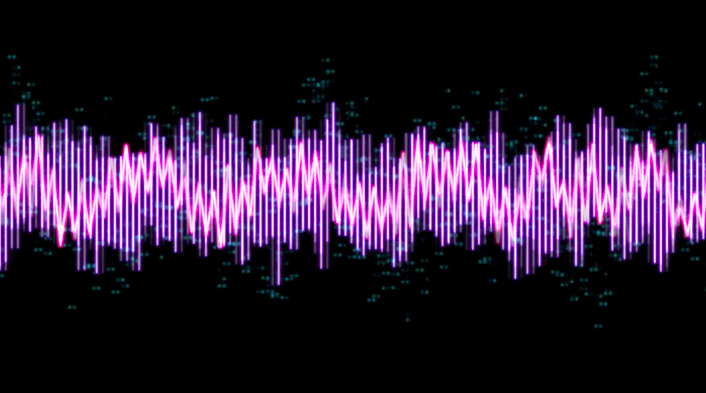












I am amazed at how amateurish the LAPD has proved to be. Joe Friday (“Badge 714” and “Dragnet”) would be appalled!
It is all very strange.